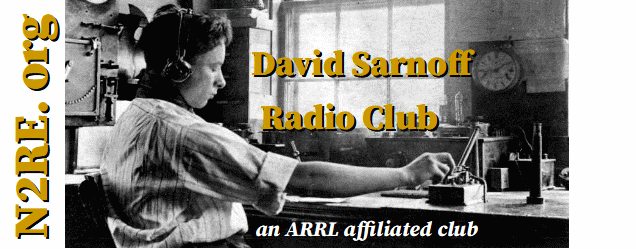This page will tell you about N2RE’s temporary station being set up for “Field Day” June 25 & 26 2022
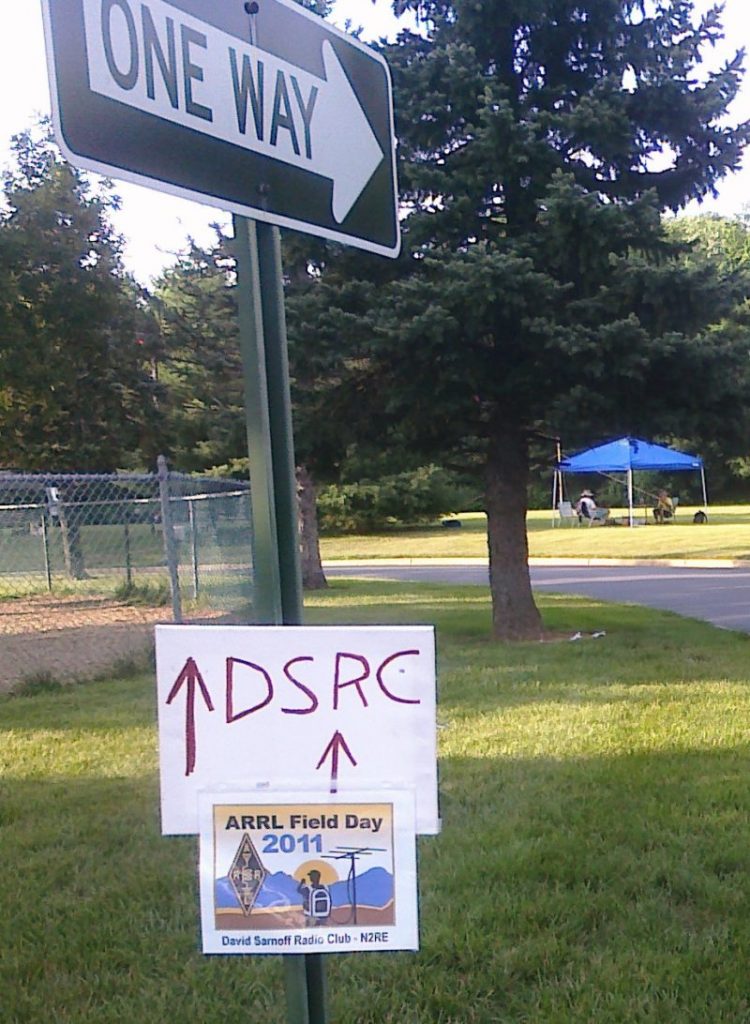
An Invitation
The David Sarnoff Radio Club has participated in ARRL Field Day for over 20 years (stats) and we consider it a part of our club preparedness training. It is, also fun.
The Event
When: Saturday June 25 to Sunday June 26, 2022 from 2 PM Eastern to 1:59 PM., BUT arrive Saturday morning to be part of the set-up team. We have antennas to raise and radios to test! (Early arrivals at 9 AM, in full swing by noon.)
Where: Behind the Red Cross Buildings, 707 Alexander Road, West Windsor, NJ (just east of US 1) Turn in to the driverway for 707 on north side of Alexander. Drive through the parking lots to the “One Way” road ehind the back building/daycare center. Directions and Map
Who: Club members, family, friends, almost anyone who asks to help.
Why: For fun and learning and teaching and trying!
What is FD?
The American Radio Relay League defines it:
ARRL Field Day is the single most popular on-the-air event held annually in the US and Canada. On the fourth weekend of June of each year, thousands of radio amateurs gather with their clubs, groups or simply with friends to operate from remote locations.
Field Day is a picnic, a campout, practice for emergencies, an informal contest and, most of all, FUN!
It is a time where many aspects of Amateur Radio come together to highlight our many roles. While some will treat it as a contest, other groups use the opportunity to practice their emergency response capabilities. It is an excellent opportunity to demonstrate Amateur Radio to the organizations that Amateur Radio might serve in an emergency, as well as the general public…The contest part is simply to contact as many other stations as possible and to learn to operate our radio gear in abnormal situations and less than optimal conditions.
http://www.arrl.org/field-day/
Field Day is a highlight of the DSRC’s annual calendar.
How do we participate
The DSRC uses FD as an opportunity to work together. Some members operate ham radio every week, some are on the air once a year (if that!) Some have very fancy and expensive radios, and others have home made antennas, homebrew radios, and even custom software programs. This is a time for everyone. The field is a big one, we try to include it all!
In keeping with this philosophy, we do not expect to “win” our operating class. We intend to learn and have fun.
We set up a generator (sometimes two generators) and maybe a solar-power station too. We put up antennas of various sorts, and we set up tents to keep the bugs/rain/cold away. The contest lasts 24 hours, so some operators are present overnight… though they may be asleep at the key, or very cold.
Yes, you can be a part of it!
In keeping with our club’s philosophy, we want to include everyone. We might have one station with an especially high antenna working a pile up on one ham band, and another one across the field, on a different band, with first time operators learning how to convert a string of phonetic alphabet words to callsigns .
The person on the microphone need not be an Extra class licensee, but someone licensed for the subband in use must supervise each station’s operation.
Each station location must have:
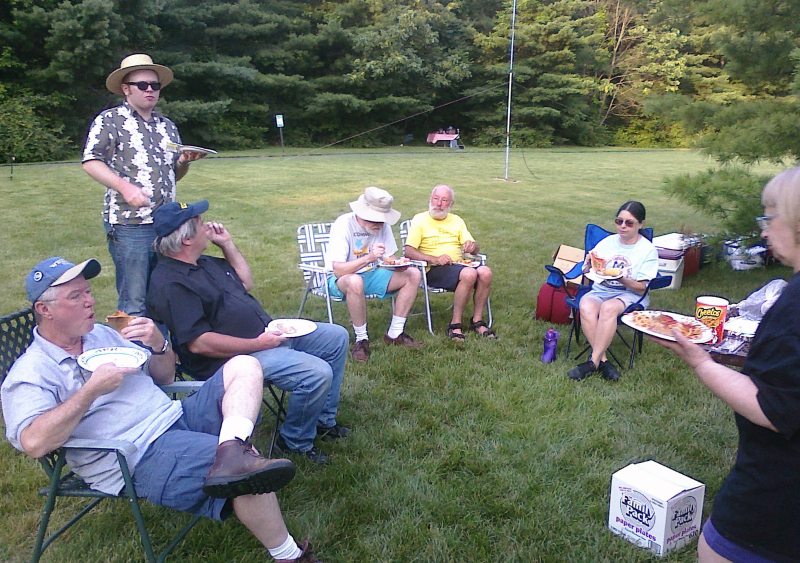
- an Operator— who speaks into the microphone, taps the key or presses buttons on the computer hooked to the transmitter.
- a Logger — who need not be a ham, who listens and writes down contacts the Operator makes, and also keeps a list of “Dupes” — contacts already made on that frequency band (so we don’t talk twice.) This is a great job for someone just learning to ham radio.
- Kibbitzers — who give advice and sometimes tell operators which way the antenna is pointed.
Additional roles include Food, Coffee, Generator refilling, Safety Officer, and sitting around chatting will be assigned during the event.
Get On The Air Station
As part of our Field Day we create space for new hams to participate and practice operating skills.
ARRL rules allow for a GET ON THE AIR station (GOTA) that uses a call sign that is different from the primary station call. This station may be operated by any amateur licensed within the last year. In addition, it may be operated by those holding Novice licenses or by those considered “generally inactive licensees”.
Field Day Rules 2022
Non-licensed individuals may participate in this station, but only under the direct supervision of a properly licensed control operator. It may be operated on any Field Day band (HF or VHF) or mode, provided it is under the direct supervision of a control operator that has license privileges that includes that band and mode.
The rules require that the GOTA Station be operated exclusively by GOTA hams (and supervised non-licensed individuals) themselves. Others can coach.. but must leave operating to GOTA folks.
Aggregate Club Score – Participate from home
Aggregate Club Score: An aggregate club score will also be published, which will be the sum of all individual entries indicating a specific club (similar to the aggregate score totals used in ARRL affiliated club competitions).
Field Day Rules 2022 section 7
Participants from any Class can optionally include a single club name with their submitted results following Field Day.
Some of our members cannot attend our Field Day portable operation. The rules provide for the “David Sarnoff ARC” to benefit from their participation from home, car, or their own portable operation. Operate for an hour, or stay up all night! It’s up to you — and the fridge is right there!
The aggregate score is listed as “David Sarnoff ARC” so use that exact phrase when submitting your log.
“The purpose of Field Day is to have fun” – club slogan
Practicalities
The Location
Behind the Red Cross Buildings, 707 Alexander Road, West Windsor, NJ This is EAST OF PRINCETON (see map)
DIRECTIONS: From US 1 North or South, Alexander Road Overpass is the southern-most of the three “Princeton” exits going east-west.
You want to Go EAST on Alexander Road (not west toward Princeton)
Once you are on Alexander Road, past the hotel driveways, look for 707 on the left. It will be next to a building that probably has no label. This main building is being reconstructed. There may be a sign saying “Red Cross Blood Services” pointing behind the main building. Follow that sign.
Go to the back of the parking lot, and keep right. Follow the one-way road around the Child Care Center and park in spaces just beyond the back building (see photo)
ALTERNATE: From Princeton Junction come west on Alexander Road which crosses the tracks just south of the railroad station. Follow it through a wooded area and turn Right into 707 and back to the site.
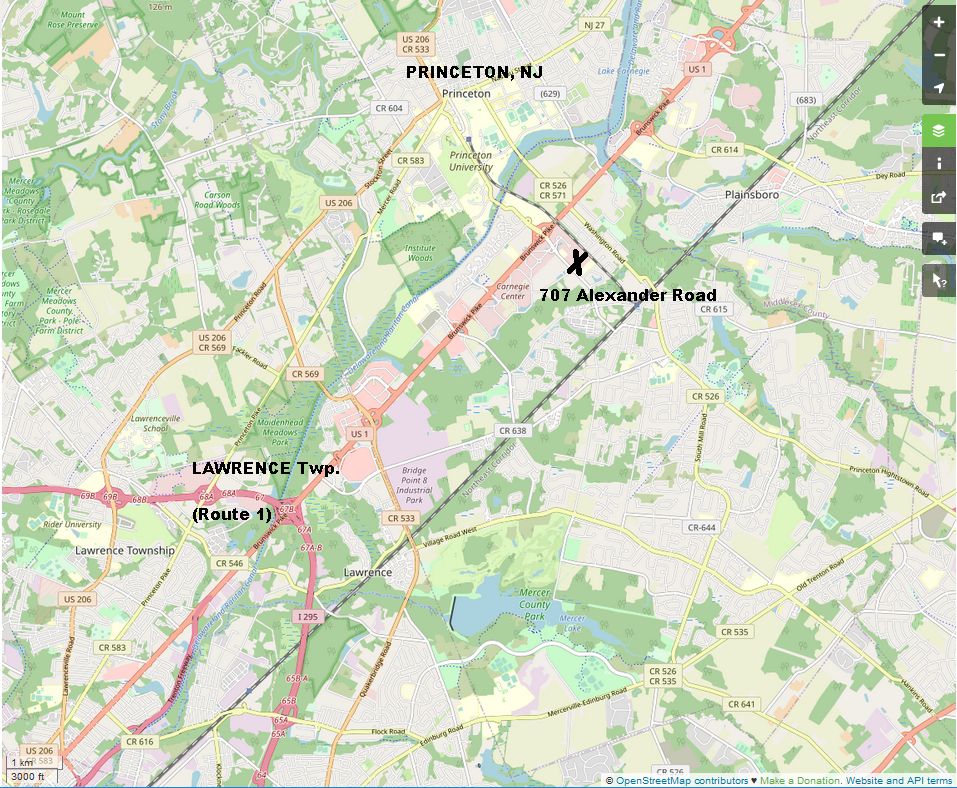
Here’s a high altitude photo of the site:
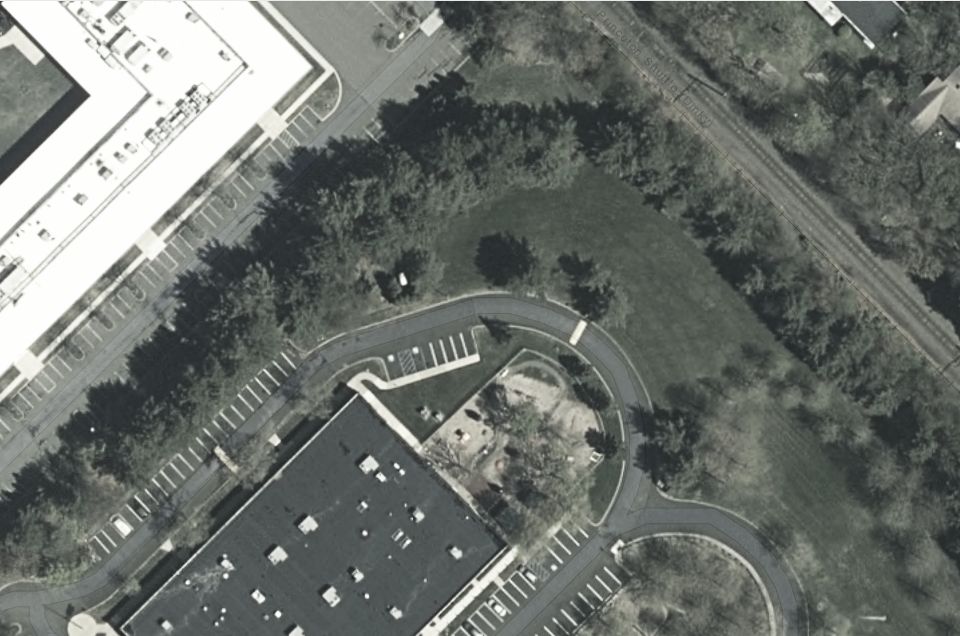
We will be mostly outdoors, in the field between the building and the railroad line (“The Dinky”) We will have access to bathrooms in the Red Cross Building.
Thank you to the American Red Cross, New Jersey Region for allowing us to use the property and to Gary Wilson, K2GW for arranging our use of the field again this year.
Things we might do
We will operate as a Class A entry:
(Class A) Club / non-club portable: Club or a non-club group of three or more persons set up
ARRL Field Day Rules 4.1
specifically for Field Day. Such stations must be located in places that are not regular station locations and must not use facilities installed for permanent station use, or use any structure installed permanently for Field Day. A single licensee or trustee for the entry is responsible for the group entry. All equipment (including antennas) must lie within a circle whose diameter does not exceed 300 meters (1000 feet). To be listed as Class A, all contacts must be made with transmitter(s) and receiver(s) operating independent of commercial power mains.
The other part of our operating class is how many HF transmitters we have on-the-air at the same time. If you look at our history you will see that we have operated anywhere from “2A” (two simultaneous stations on the air) to “7A” with seven transmitters. We will use the club’s callsign, N2RE for our primary station. We will decide on our class on field day morning. This year we return to Southern New Jersey secion, so our exchange might be “N2RE 7A SNJ”
Simple ways to operate
For beginners with only a handheld or mobile VHF FM radio, you might be able to operate as a “Class B-Battery” station… just don’t make contacts with the motor running.
(Class B – Battery) One or two person portable: A Field Day station set up and operated by no more
2022 rules 4.4
than two persons. All contacts must be made using an output power of 5 Watts or less and the power source must be something other than commercial mains or motor-driven generator. Other provisions are the same for Class A except it is not eligible for a GOTA or free VHF station. One- and two-person Class B – Battery entries will be listed separately.
So how do you make contacts? Go somewhere high up… hike up a hill, drive to a park. Then use the simplex frequencies to talk with other stations. Know your section (the dividing line between NNJ and SNJ is Mercer County line) and your exchange is “1-B-SNJ” or NNJ or wherever you ended up. Each band is a new contact, so if you talk on 2 and have 440, change to 446 and make another quick contact.
Simplex Frequencies for FM (*= National Calling Freq, allow emergency traffic)
- 146.52* MHz
- 146.55
- 146.58
- other simplex frequencies tend to be non-contest use
- 223.50* MHz
- 223.52
- 446.000* MHz
- 446.0125
- 446.025
- etc,
Bonuses!
There are many areas where we can earn bonus Points, including:
- 100% Emergency Power: We have no electricity on site, so we can earn this bonus!
- Media Publicity: we have to get publicity actually published. This has happened in the past, but we need someone to coordinate this.
- Public Location: If we were in a mall parking lot, we could get this one. But we aren’t. The Public Information Table bonus may also be possible.
- Message Origination to Section Manager: We often do this. We need someone to coordinate this.
- Message Handling: If some one is interested, we might do this.
- Satellite QSO: We plan to try this on Sunday morning.
- Alternate Power: 100 bonus points for Field Day groups making a minimum of five QSOs without using power from commercial mains or petroleum driven generator: We can do this if it’s a sunny day and if someone brings their solar charger.
- W1AW Bulletin: We need to copy the bulletin, which is sent on HF during Field Day and the night before as well.
- Educational activity bonus: This is new, and we are planning to hold one.
- Site Visitation by an elected governmental official
- Site Visitation by a representative of an agency(American Red Cross, Salvation Army, local Emergency Management, law enforcement, etc.) as the result of an invitation issued by your group.
- GOTA Bonuses (see rules)
A few of these can be earned by each Aggregate station. Each one gives the club 100 bonus points!
Safety
One aspect of ham radio is that we teach each other how to operate radios in a safe manner. We suggest every participant gain understanding of the requirements on Radio Frequency exposure. We also recommend that everyone use safe practices with electricity and with structures. If operators bring children, they must be supervised appropriately.
RF Exposure Evaluation
Understanding the dangers of RF is crucial. We have a web page full of useful links HERE
The final link on that page is to a QST Magazine case study of a Field Day site, and a good place to start.
What to bring
We assemble stations from equipment brought from our homes. Rule #1 is to LABEL your equipment with your name and callsign. Rule #2 is to be part of the discussion as we plan to cover all the bases. Rule #3 is to avoid bringing especially fragile or expensive equipment which might be damaged under emergency conditions.
To get our stations up and running we will need:
- Ham Transceivers
- Antennas
- RF Cable
- Towers, masts
- Guy ropes/wires
- Ground stakes, anchors
- Generator
- Extension cords
- Keyers, headphones
- Tents
- Awnings
- Storage for radio items
- Cooking
- Coffee
- Tables
- Chairs
- Lights
- Clipboards … and may other things you might think of!
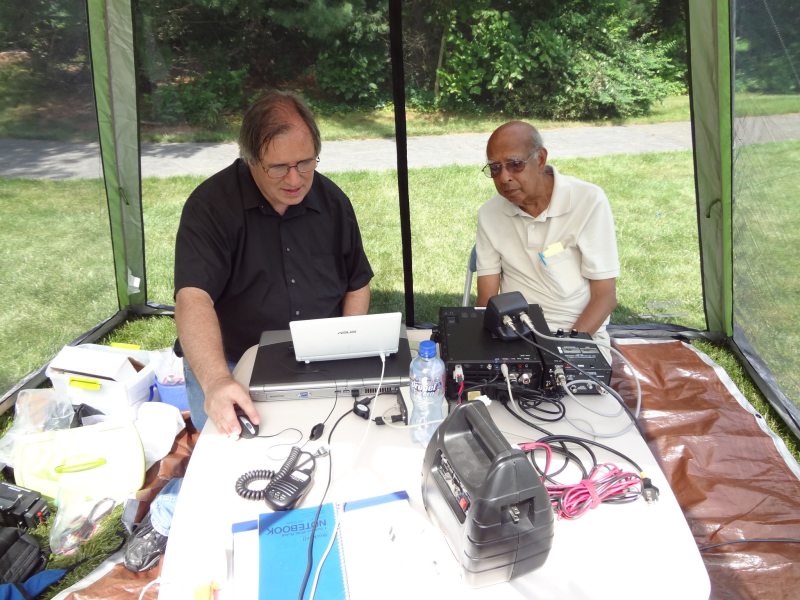
While you are at it:
- Bring a long sleeved shirt, it’ll get cold at night
- Bring insect repellent (and sunblock, if you use it)
- Bring a hat
- Bring a chair you would like to operate in… and maybe a cushion
- If you have a badge with name and callsign, bring and wear that!
- Bring a mask. Use it as a courtesy when in proximity with those worried about COVID transmission.
What to do Next
If you are on our club e-mail group, find the message “Field Day planning gets serious! June 25&26 (survey request)” or another with the field day survey. Or contact Charlie Dieterich.
If you are a new ham, or studying to be licensed, please point that out. If part of the MORE Project, talk to organizers there.
Planning works better when we have some idea how many folks are likely to show up (and when) so please fill out a survey even if you are not sure.
Reserve some time on the weekend of June 25 and 26… you do not need to attend the whole thing! If you can come for setup (9 AM to 2 PM on Saturday) or tear-down (about Noon to 3 PM on Sunday) that would be especially helpful. If you would like to operate between Midnight and 8 AM on Sunday, that would be great too.
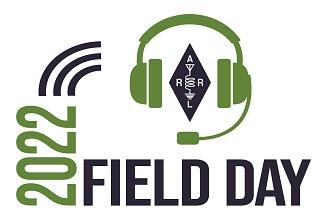
Whatever you can do, we are glad to have you be a part of David Sarnoff Radio Club Field Day
